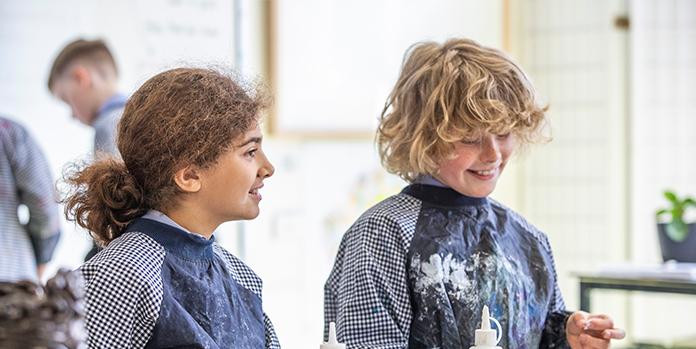Understanding Self and Others in Junior Primary (Prep – Year 2)
Primary school is as much a developmental journey as it is an educational one. Our Prep students are right at the start of this journey, going through their first experiences of spending time outside the home and learning how to live with other people.
Prep students start out focused on their own world. This egocentric view is the reason why we see our youngest students playing independently at the start of the school year rather than interacting with others. They may have lots of children around them, but they still play on their own.
As their first year of school progresses, students start to play more directly with one another, which reflects that they are starting to recognise other people’s different perspectives and to take them into account.
As students move through Junior Primary, their development gradually becomes focused on knowing their place in social situations, and this requires comparison against those with different backgrounds, experiences and genders.
The more varied their primary school environment, the more opportunities children have to appreciate the differences in others as well as their similarities. In other words, learning in an environment that reflects the world outside the campus is a chance to break down the ‘fear factor’, setting a foundation for respectful relationships in the future.
Becoming a Leader in Upper Primary (Years 3 – 6)
As students move into Upper Primary, gender differences become more pronounced, which present new opportunities for the development of understanding and empathy. These are the years when the social skills learned in Junior Primary are refined and students gain a deeper understanding of others’ perspectives.
In Years 3 and 4 students become more focused on the differences between themselves and their friends, and how they fit in. This awareness brings on new challenges within friendship groups, which can be a concern for some. At this stage, it’s useful to remember that recognising differences of opinion and learning to take them into account are important to a child’s development.
It’s also useful to recognise that, at this stage, boys and girls have slightly different needs in terms of their social and emotional development. This means it is appropriate at times for teachers and others engaged in pastoral care to spend time with boys and girls separately to discuss challenges and build on friendship skills. The ability to do this in a coeducational environment supports healthy, long lasting relationship skills.
As they reach Years 5 and 6, students are becoming quite conscious of, and articulate about, the differences between themselves and others, along with the ways in which people in a group balance and complement each other.
During this particularly crucial developmental period, the direct, regular and varied interaction with the opposite gender that is provided by a coeducational environment can lay the groundwork for positive, confident, and respectful behaviours between genders into adolescence and beyond.
These final years of primary school also mark the time when leadership qualities come to the fore. Students are bringing together all the social skills developed throughout their time at primary school. We see students feeding off each other’s experiences during these years, continuing to learn from each other as they become leaders of their school.
Providing opportunities for students to develop leadership at this age is a critical developmental factor. Children learn that leadership is about hard work, commitment and service to others.
It is a formative time but one which sets students up for a successful future life.
Royce Helm
Head of Grimwade House
Related topics
